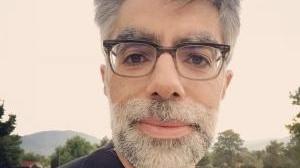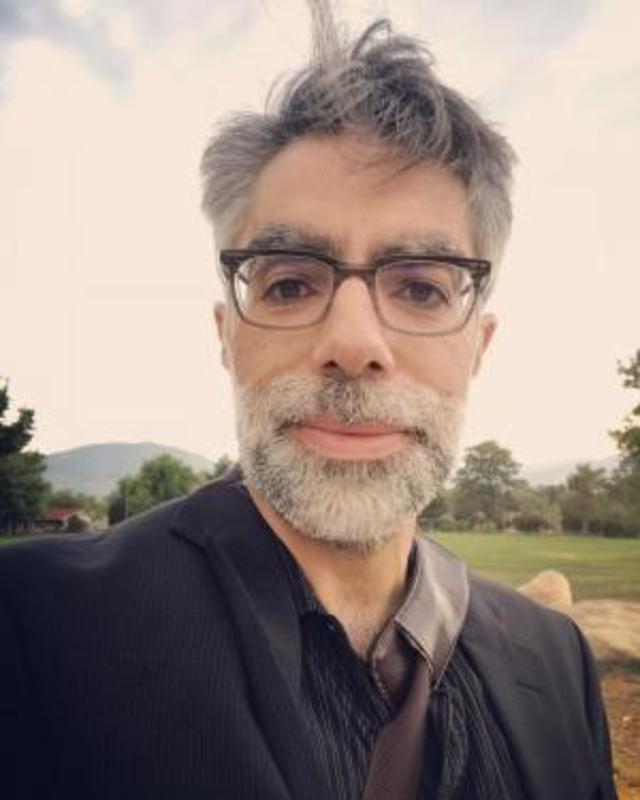
Usama Alshaibi was born in Baghdad, Iraq in 1969 and spent his formative years living between the United States and the Middle East. He’s an active filmmaker and artist with many short films, documentaries and feature films to his credit. His films have screened at underground and international film festivals, and have been broadcast on television stations across the globe.
In early 2004, nine months after the United States invaded Iraq, Usama returned to his birthplace to shoot his first feature documentary Nice Bombs. The documentary had a theatrical release in Chicago and New York, and a broadcast premiere on the Sundance Channel.
His controversial feature film Profane has played globally at underground film festivals and won several awards, including best feature film when it premiered at the Boston Underground Film Festival.
His second documentary film American Arab was produced by the Chicago documentary powerhouse Kartemquin Films. The film had its world premiere at the International Documentary Film Festival Amsterdam (IDFA), and a national television broadcast through PBS World Channel, as part of the fourth season of America ReFramed. The documentary was also televised on Canadian Broadcasting Corporation, the Japan Broadcasting Corporation and VGTV in Norway.
Usama has produced and directed music videos for independent record labels such as Thrill Jockey, Skin Graft and Drag City. He was commissioned by Detroit Public Television to direct and produce two segments for the award-winning series Arab-American Stories which aired nationally on public television stations.
Usama’s short film The Muslim Meme was part of an activist group show called Filmmakers Unite. The show has toured internationally and had a week-long screening at the Roxie Theater in San Francisco. Usama’s most recent short film Here, his response to the COVID-19 pandemic, was featured in Denver’s Westword Magazine.
The Chicago Tribune, The New York Times, Punk Planet and Variety have covered his work and his transgressive short films are featured in Jack Sargeant’s book Flesh and Excess: On Underground Film. An interview with Usama appears in Studs Terkel’s book Hope Dies Last, and his coming-of-Arab story is in Louis Cainkar’s book, Homeland Insecurity: The Arab American and Muslim American Experience After 9/11.
Usama’s films have received several grants from such organizations as the John D. and Catherine T. MacArthur Foundation, the Arab Fund for Arts and Culture, the Playboy Foundation, and the Creative Capital Foundation for the Arts. He’s also the winner of the Creative Promise award at Tribeca All Access in New York City.
Usama lived in Chicago for over 17 years and worked as a digital archivist at the Chicago History Museum, and as a radio host and producer for Chicago Public Media. Currently, Usama is a Visiting Assistant Professor at Colorado State University, and lives in Colorado with his daughter Muneera.

Usama Alshaibi was born in Baghdad, Iraq in 1969 and spent his formative years living between the United States and the Middle East. He’s an active filmmaker and artist with many short films, documentaries and feature films to his credit. His films have screened at underground and international film festivals, and have been broadcast on television stations across the globe.
In early 2004, nine months after the United States invaded Iraq, Usama returned to his birthplace to shoot his first feature documentary Nice Bombs. The documentary had a theatrical release in Chicago and New York, and a broadcast premiere on the Sundance Channel.
His controversial feature film Profane has played globally at underground film festivals and won several awards, including best feature film when it premiered at the Boston Underground Film Festival.
His second documentary film American Arab was produced by the Chicago documentary powerhouse Kartemquin Films. The film had its world premiere at the International Documentary Film Festival Amsterdam (IDFA), and a national television broadcast through PBS World Channel, as part of the fourth season of America ReFramed. The documentary was also televised on Canadian Broadcasting Corporation, the Japan Broadcasting Corporation and VGTV in Norway.
Usama has produced and directed music videos for independent record labels such as Thrill Jockey, Skin Graft and Drag City. He was commissioned by Detroit Public Television to direct and produce two segments for the award-winning series Arab-American Stories which aired nationally on public television stations.
Usama’s short film The Muslim Meme was part of an activist group show called Filmmakers Unite. The show has toured internationally and had a week-long screening at the Roxie Theater in San Francisco. Usama’s most recent short film Here, his response to the COVID-19 pandemic, was featured in Denver’s Westword Magazine.
The Chicago Tribune, The New York Times, Punk Planet and Variety have covered his work and his transgressive short films are featured in Jack Sargeant’s book Flesh and Excess: On Underground Film. An interview with Usama appears in Studs Terkel’s book Hope Dies Last, and his coming-of-Arab story is in Louis Cainkar’s book, Homeland Insecurity: The Arab American and Muslim American Experience After 9/11.
Usama’s films have received several grants from such organizations as the John D. and Catherine T. MacArthur Foundation, the Arab Fund for Arts and Culture, the Playboy Foundation, and the Creative Capital Foundation for the Arts. He’s also the winner of the Creative Promise award at Tribeca All Access in New York City.
Usama lived in Chicago for over 17 years and worked as a digital archivist at the Chicago History Museum, and as a radio host and producer for Chicago Public Media. Currently, Usama is a Visiting Assistant Professor at Colorado State University, and lives in Colorado with his daughter Muneera.